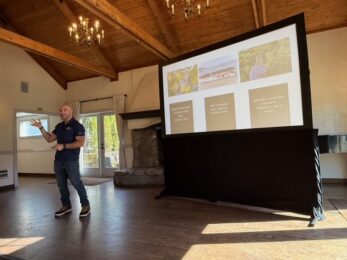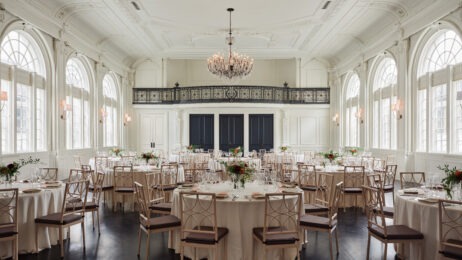It turns out hiring back thousands of hotel employees, from chefs and bartenders to housekeepers and salespeople, is even harder than doing mass layoffs.
Popular tourist destinations like Las Vegas are finding workforces already stretched thin by the absence of overseas seasonal workers stranded in their home countries due to pandemic restrictions. Now, convention hotels are competing with newly launched properties, Amazon fulfillment centers, alternate careers and full-time parenting duties.
Some properties report busing in part-time workers from Arizona and California to staff all those manned buffets and outdoor gatherings. Billboards advertising job fairs have started popping up on the Las Vegas Beltway. Others are eliminating amenities such as daily housekeeping and room service.
Carl Winston, director at San Diego State University‘s L. Robert Payne School of Hospitality & Tourism Management, says top executives from major brands are calling him to personally interview college students because they are desperate for employees to clean rooms and check people in. He is working with theater and television production students to find candidates to fill the event professional jobs of tomorrow.
“Employers are having trouble finding people with the right skill set,” he says.
New Skills at a Premium
Melanie Velasquez, an account manager with Luxor Staffing, calls the situation an “employee drought” and says the priority is finding weekend crews to give a break to hotel workers putting in seven-day-a-week shifts.
Her company is “doing whatever it takes” to hire hundreds of people each week for hospitality clients. That includes radio, television and billboard ads, job fairs and a partnership with Goodwill Industries. Some properties, she says, are offering incentives or higher pay to get the right candidates.
It is a marathon, not a sprint, as even those who were previously in the hospitality industry must be trained on new sanitation protocols. “It has been a roller coaster ride,” she says.
Amy Calvert, CEO at EIC Events Industry Council, which produced the Workforce and Wellness resource guide as part of APEX COVID-19 Business Recovery Task Force, stresses the importance of supporting front-line workers right now. “They are working incredible hours and struggling with transitioning back while dealing with scheduling challenges at home,” she notes. She suggests that, as an industry, planners need to—metaphorically, it’s still a pandemic—put their arms around their team members, making sure they get the protocol and diversity training they need to come back stronger. “We have to invest in our workforce,” she says.
In order to do that, she thinks it’s time to re-examine how events are funded. “The business model of events is a bit broken,” she says, pointing to reliance on a small set of stakeholder sponsors. “If we are creating valuable experiences people will pay for, that could help to pay for the incredible amount of staff time it takes to put on hybrid events.”
To fill the pipeline with the next generation of meeting professionals, Calvert urges focus on opportunities. “We have to do a better job of helping young people at the university level see that there is a career path,” she says.
Retraining Required
At Caesars Entertainment, Don Ross, vice president of catering, convention and events, says the hundred or so servers hired for the opening of CAESARS FORUM and then furloughed just weeks before the shutdown have largely responded enthusiastically when they heard the company “is getting the band back together.”
He echoes others in the observation that, while some had left town or gone into real estate when the separation became more permanent, most had already been trained on sanitation and just need to be brought up to speed on new protocols—once the county releases them.
“It won’t be business as usual; it is a fresh start for the future,” he says.
Caesars contracted with Albertsons to administer 10,000 Covid vaccination shots at stations in ballrooms at Rio Las Vegas Hotel & Casino, Bally’s Las Vegas Hotel & Casino, Caesars Palace Las Vegas and Flamingo Las Vegas Hotel & Casino. The vaccine wasn’t mandated, but it was incentivized.
Ross predicts that by August the number of people meeting will look as if Covid never happened. “It’s game on when meeting sizes open up in June,” he says.
How will they staff all those catering teams? Ross believes true hospitality professionals enjoy taking care of people and will come back when the time is right. “Our employees are so excited to be back to work, you will be able to see their smiles through their masks.”
A Flexible Solution
Jeff Quade, executive vice president of exhibitions with convention logistics company GES, predicts the return of big meetings will be “a little lumpy,” particularly in some parts of the country, for the rest of this year. An uneven flow of trade shows, with extreme peaks and valleys in a given venue, will make rehiring difficult if employers can’t guarantee steady work after letting long-time employees go last year.
That’s why GES launched Flex Talent Pool in Las Vegas in January to help provide trained, temporary staffing. The first big show the program will be supporting is WasteExpo, which will take over 200,000 sq. ft. of space at Las Vegas Convention Center at the end of June.
In addition to trying to lure back former employees or competitors’ former employees from jobs they may have taken in shipping fulfilment centers or assisted living, he is also tasked with finding talent for new roles, such as health and safety checking, monitoring temperatures and streaming technology.
There may be additional incremental costs,” he warns, even if you are just adding those duties to existing roles. “But those costs are far outweighed by the benefits of holding meetings in person.”
For similar reasons, The American Rental Association recently launched a job board aimed at increasing awareness of careers in equipment and event rental and providing a way for employers and qualified candidates to connect.
Building Back Better
Greg DeShields, executive director with Tourism Diversity Matters, compares the current situation to the firehose effect following the sudden on-switch of leisure demand in some cities. Once the shock has worked its way through the system, and business and group travel starts to return by fall, he hopes the industry will rehire more equitably, with more diverse representation across all job levels.
“Right now, a lot of people are still adapting to managing children at home, and women, in particular, are finding getting back to work logistically challenging,” he says. “And the desperation companies are feeling will make thoughtful human resources practices difficult. But there is hope for the future.”
DeShields’ vision is that students currently studying computer science or health and safety will find the hospitality industry and help to build the pipeline for the next generation of hoteliers. In the meantime, focusing on supplier diversity, cross-training current employees and higher wages and incentives could move the industry in the right direction, he says.





